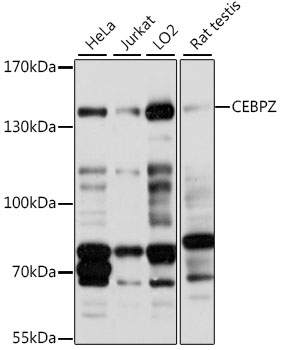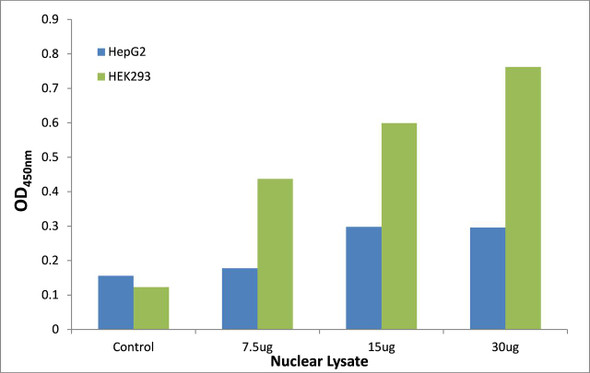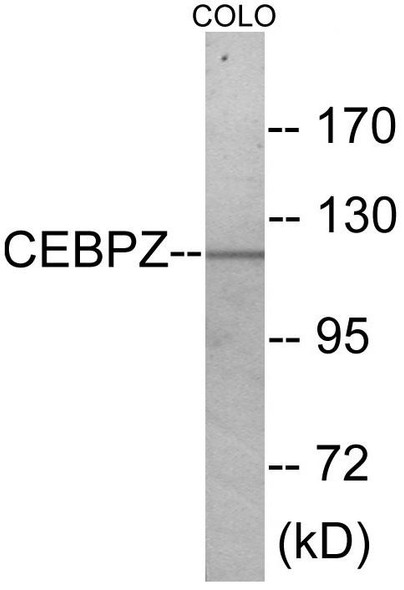Epigenetics & Nuclear Signaling Antibodies 2
Anti-CEBPZ Antibody (CAB16478)
- SKU:
- CAB16478
- Product Type:
- Antibody
- Reactivity:
- Human
- Reactivity:
- Rat
- Host Species:
- Rabbit
- Isotype:
- IgG
- Antibody Type:
- Polyclonal Antibody
- Research Area:
- Epigenetics and Nuclear Signaling
Description
| Antibody Name: | Anti-CEBPZ Antibody |
| Antibody SKU: | CAB16478 |
| Antibody Size: | 20uL, 50uL, 100uL |
| Application: | WB |
| Reactivity: | Human, Rat |
| Host Species: | Rabbit |
| Immunogen: | Recombinant fusion protein containing a sequence corresponding to amino acids 1-230 of human CEBPZ (NP_005751.2). |
| Application: | WB |
| Recommended Dilution: | WB 1:500 - 1:2000 |
| Reactivity: | Human, Rat |
| Positive Samples: | HeLa, Jurkat, LO2, Rat testis |
| Immunogen: | Recombinant fusion protein containing a sequence corresponding to amino acids 1-230 of human CEBPZ (NP_005751.2). |
| Purification Method: | Affinity purification |
| Storage Buffer: | Store at -20'C. Avoid freeze / thaw cycles. Buffer: PBS with 0.02% sodium azide, 50% glycerol, pH7.3. |
| Isotype: | IgG |
| Sequence: | MAAV KEPL EFHA KRPW RPEE AVED PDEE DEDN TSEA ENGF SLEE VLRL GGTK QDYL MLAT LDEN EEVI DGGK KGAI DDLQ QGEL EAFI QNLN LAKY TKAS LVEE DEPA EKEN SSKK EVKI PKIN NKNT AESQ RTSV NKVK NKNR PEPH SDEN GSTT PKVK KDKQ NIFE FFER QTLL LRPG GKWY DLEY SNEY SLKP QPQD VVSK YKTL AQKL YQHE INLF KSKT NSQK GA |
| Gene ID: | 10153 |
| Uniprot: | Q03701 |
| Cellular Location: | Nucleus |
| Calculated MW: | 120kDa |
| Observed MW: | 140kDa |
| Synonyms: | CEBPZ, CBF, CBF2, HSP-CBF, NOC1 |
| Background: | This gene belongs to the CEBP family. The encoded protein plays a role in cellular response to environmental stimuli through a transcriptional process that involves heat shock factors, conserved DNA elements (heat shock elements or HSEs) and CCAAT boxes. The protein acts as a DNA-binding transcriptional activator and regulates the heat-shock protein 70 (HSP70) promoter in a CCAAT-dependent manner. The protein is also involved in cell growth and differentiation, particularly, hematopoietic differentiation. Methylation of the promoter of this gene or mutations within the gene may be correlated with occurance of acute myeloid leukemia (AML). |
| UniProt Protein Function: | C/EBP-zeta: Stimulates transcription from the HSP70 promoter. Belongs to the CBF/MAK21 family. |
| UniProt Protein Details: | Protein type:Transcription factor; RNA-binding Chromosomal Location of Human Ortholog: 2p22.2 Molecular Function:DNA binding Biological Process: positive regulation of transcription from RNA polymerase II promoter; transcription from RNA polymerase II promoter |
| NCBI Summary: | This gene belongs to the CEBP family. The encoded protein plays a role in cellular response to environmental stimuli through a transcriptional process that involves heat shock factors, conserved DNA elements (heat shock elements or HSEs) and CCAAT boxes. The protein acts as a DNA-binding transcriptional activator and regulates the heat-shock protein 70 (HSP70) promoter in a CCAAT-dependent manner. The protein is also involved in cell growth and differentiation, particularly, hematopoietic differentiation. Methylation of the promoter of this gene or mutations within the gene may be correlated with occurance of acute myeloid leukemia (AML). [provided by RefSeq, Jun 2016] |
| UniProt Code: | Q03701 |
| NCBI GenInfo Identifier: | 308153621 |
| NCBI Gene ID: | 10153 |
| NCBI Accession: | Q03701.3 |
| UniProt Secondary Accession: | Q03701,Q8NE75, |
| UniProt Related Accession: | Q03701 |
| Molecular Weight: | 120,974 Da |
| NCBI Full Name: | CCAAT/enhancer-binding protein zeta |
| NCBI Synonym Full Names: | CCAAT/enhancer binding protein zeta |
| NCBI Official Symbol: | CEBPZ |
| NCBI Official Synonym Symbols: | CBF; CBF2; NOC1; HSP-CBF |
| NCBI Protein Information: | CCAAT/enhancer-binding protein zeta |
| UniProt Protein Name: | CCAAT/enhancer-binding protein zeta |
| UniProt Synonym Protein Names: | CCAAT-box-binding transcription factor; CBF; CCAAT-binding factor |
| Protein Family: | CCAAT/enhancer-binding protein |
| UniProt Gene Name: | CEBPZ |
| UniProt Entry Name: | CEBPZ_HUMAN |
View AllClose







